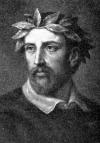Biography
Torquato Tasso was born in Sorrento, near Naples in Italy, in 1544. As a young man he was educated by Jesuits at the Court of the Dukes of Urbino and later studied law and philosophy at the University of Padua. He completed his studies at the University of Bologna, from where he later received an invitation, in 1565, to join the brilliant court of the Este at Ferrara, where he remained for many years. There he wrote a number of beautiful, ltrical poems. He had already achieved fame prior to this when, aged just 18, he published his chivlaric poem Rinaldo in 1562.
Other works by Tasso include the pastoral play Aminta (1573) and his masterpiece Gerusalemme Liberata (Jeusralem Delivered) - an epic of the exploits of Godfrey of Boulogne during the First Crusade. To some extent, Tasso was a victim to his own religious scruples and desire not to violate the rules of good literature which were then commonly accepted. Before publication, he would offer up his work to scrunity from his friends, as well as the church authorities. However, their sometimes harsh criticisms led him to develop an persecution complex. He was also concerned that actions in life, in which he had sometimes been carried away by storms of passion, were not free from reproach. Psychologically unstable, and following a fit of violence, Tasso washe confined, first in a convent, then intermittently (1579-87) in a hospital.
In his last years, he lived with the Gonzagas in Mantua and then wandered restlessly throughout Italy searching for ideal working conditions at other courts. He died at a monastery in Rome in 1595, just one day before he was to have been crowned poet laureate.
Tasso's Jerusalem Delivered has since been lauded both as the embodiment of lyric sentiment and as the greatest poem of the Counter-Reformation. The religious motif is strong, the subplots of love and adventure are well developed, and chivalric exploits are recounted in a majestic classical style. The work had enormous influence on English poets, especially Milton. The legend of Tasso's doomed love for Leonora d'Este was immortalized in works by Byron, Goethe, and others and made Tasso a romantic hero. ..






